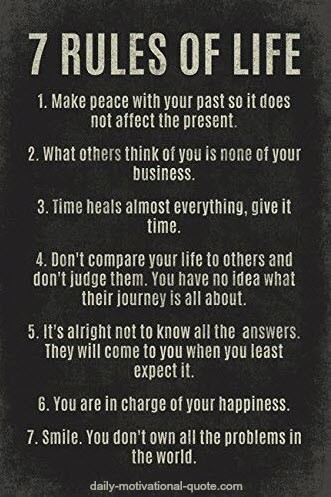The Four Agreements by Don Miguel Ruiz, is a great little book. It lays out four simple ideas for a happy and successful life. It’s been translated into 40 languages and has sold six and half million copies in the USA.
The Four Agreements are:
- Be impeccable with your word.
- Don’t take anything personally.
- Don’t make assumptions.
- Always do your best.
Great advice, as far as I’m concerned. I try to follow it in my own life.
Today, I can across a graphic that listed seven rules for life. Different take, but a similar concept.

Some people think that these brief pieces of advice, are nothing but sound bites. I however, have found that they can be helpful as you go about building your lie and career success.
I urge my coaching clients to pay attention to this type of advice and to do two things. First think about the advice. Ask yourself, “How does this apply to me, my life and my career. Then, do something about it.
Let’s use number 4 — “Don’t compare your life to others, and don’t judge them. You have no idea what their journey is all about” — as an example.
When I think about this bit of advice, I see two ideas that apply to me.
First, while I have done very well financially in my life and career, I have many friends who have done better. I find that I’m happier and more relaxed when I focus on what I have and what I did to get myself into a financially secure position — not when I compare myself to some of my friends who are in the 1%.
Second, as Cathy, my wife, says, “Everybody’s got their own bag of rocks to carry around.” Judging people without knowing their situation is not good for you — nor for them. Recently, I had a student miss an important class. My original assumption was that she didn’t care. She came to me before the next class and apologized for missing the important class. As it turns out, there was a problem with her financial aid, and she was in a meeting with the financial aid office to get it straightened out. The meeting ran very long, and she missed the class.
Here’s what I learned from this situation — and it goes back to the four agreements. I assumed the student didn’t care. She was absent from an important class. In reality, the student had a very pressing, and stressful, situation that needed to be addressed immediately. My assumption was wrong. In this case, it turned out OK, because the student came to me to explain the situation. If she hadn’t, my incorrect assumption would have colored my thinking about her class performance.
The point here? When advice comes your way, use it. Think about how it applies to you, and thentake some action to put that advice into play.

Speak Your Mind